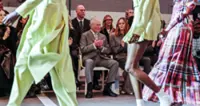All sectors are working on solutions to reduce their environmental footprint, as is the eyewear industry, which is doubling down on initiatives to achieve this.
Often singled out for its impact on the planet, the fashion industry is trying to reinvent itself with less polluting materials, more virtuous production processes, and even new approaches such as second-hand shopping or upcycling.





